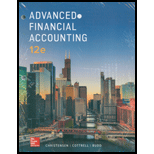
ADVANCED FINANCIAL ACCT.(LL) >CUSTOM<
12th Edition
ISBN: 9781260824292
Author: Christensen
Publisher: MCGRAW-HILL HIGHER EDUCATION
expand_more
expand_more
format_list_bulleted
Concept explainers
Question
Chapter 17, Problem 17.10Q
To determine
Outstanding obligations at the end of fiscal period: depends on the governmental unit’s policy. The government may allow outstanding liabilities to lapse; that is the unit will not honor these obligations in current year but it will carried over to the New Year, the New Year budget must rebuild them. A second method is to carry over the obligations as non-lapsing spending authority. This method recognizes the practical aspects of encumbrances outstanding at the end of fiscal period.
To explain: the main difference between lapsing and non-lapsing methods of accounting for encumbrances at the end of the fiscal year, and actual expenditure in subsequent year.
Expert Solution & Answer
Want to see the full answer?
Check out a sample textbook solution
Students have asked these similar questions
Provide Answer
Overhead at the end of the year was?
Can you explain this general accounting question using accurate calculation methods?
Chapter 17 Solutions
ADVANCED FINANCIAL ACCT.(LL) >CUSTOM<
Ch. 17 - Prob. 17.1QCh. 17 - What are the nine funds that local and state...Ch. 17 - Compare the modified accrual basis with the...Ch. 17 - Prob. 17.4QCh. 17 - When are property taxes recognized as revenue in...Ch. 17 - Prob. 17.6QCh. 17 - Prob. 17.7QCh. 17 - Are all expenditures encumbered?Ch. 17 - Prob. 17.9QCh. 17 - Prob. 17.10Q
Ch. 17 - When is the expenditure for inventories recognized...Ch. 17 - Prob. 17.12QCh. 17 - Prob. 17.13QCh. 17 - Prob. 17.14QCh. 17 - Prob. 17.15QCh. 17 - Prob. 17.1CCh. 17 - Prob. 17.2CCh. 17 - Prob. 17.3CCh. 17 - Prob. 17.1.1ECh. 17 - Prob. 17.1.2ECh. 17 - Prob. 17.1.3ECh. 17 - Prob. 17.1.4ECh. 17 - Prob. 17.1.5ECh. 17 - Prob. 17.2ECh. 17 - Prob. 17.3.1ECh. 17 - Prob. 17.3.2ECh. 17 - Prob. 17.3.3ECh. 17 - Prob. 17.3.4ECh. 17 - Prob. 17.3.5ECh. 17 - Prob. 17.3.6ECh. 17 - Prob. 17.3.7ECh. 17 - Prob. 17.3.8ECh. 17 - Prob. 17.3.9ECh. 17 - Prob. 17.3.10ECh. 17 - Prob. 17.4.1ECh. 17 - Prob. 17.4.2ECh. 17 - Prob. 17.4.3ECh. 17 - Prob. 17.4.4ECh. 17 - Prob. 17.4.5ECh. 17 - Prob. 17.4.6ECh. 17 - Prob. 17.4.7ECh. 17 - Prob. 17.4.8ECh. 17 - Prob. 17.4.9ECh. 17 - Prob. 17.4.10ECh. 17 - Prob. 17.5ECh. 17 - Prob. 17.6ECh. 17 - Prob. 17.7ECh. 17 - Computation of Revenues Reported on the Statement...Ch. 17 - Prob. 17.9ECh. 17 - Prob. 17.10ECh. 17 - Prob. 17.11ECh. 17 - Prob. 17.12ECh. 17 - General Fund Entries [AICPA Adapted] The following...Ch. 17 - Prob. 17.14PCh. 17 - Prob. 17.15PCh. 17 - Prob. 17.16PCh. 17 - Prob. 17.17PCh. 17 - Prob. 17.18.1PCh. 17 - Prob. 17.18.2PCh. 17 - Prob. 17.18.3PCh. 17 - Prob. 17.18.4PCh. 17 - Prob. 17.18.5PCh. 17 - Prob. 17.18.6PCh. 17 - Prob. 17.18.7PCh. 17 - Prob. 17.18.8PCh. 17 - Prob. 17.18.9PCh. 17 - Prob. 17.18.10PCh. 17 - Prob. 17.18.11PCh. 17 - Prob. 17.18.12PCh. 17 - Prob. 17.18.13PCh. 17 - Prob. 17.18.14PCh. 17 - Prob. 17.18.15PCh. 17 - Prob. 17.18.16PCh. 17 - Prob. 17.18.17PCh. 17 - Prob. 17.18.18PCh. 17 - Prob. 17.18.19PCh. 17 - Prob. 17.18.20PCh. 17 - Prob. 17.18.21PCh. 17 - Prob. 17.18.22PCh. 17 - Prob. 17.18.23PCh. 17 - Prob. 17.18.24PCh. 17 - Prob. 17.18.25PCh. 17 - Prob. 17.18.26PCh. 17 - Prob. 17.18.27PCh. 17 - General Fund Entries [AICPA Adapted] DeKalb City...Ch. 17 - Prob. 17.18.29PCh. 17 - Prob. 17.18.30PCh. 17 - Prob. 17.18.31PCh. 17 - General Fund Entries [AICPA Adapted] DeKalb City...Ch. 17 - Prob. 17.18.33PCh. 17 - Prob. 17.18.34PCh. 17 - Prob. 17.18.35PCh. 17 - General Fund Entries [AICPA Adapted] DeKalb City...Ch. 17 - Prob. 17.18.37PCh. 17 - Prob. 17.18.38PCh. 17 - Prob. 17.18.39PCh. 17 - Prob. 17.19PCh. 17 - Prob. 17.20P
Knowledge Booster
Learn more about
Need a deep-dive on the concept behind this application? Look no further. Learn more about this topic, accounting and related others by exploring similar questions and additional content below.Similar questions
- Can you solve this financial accounting problem with appropriate steps and explanations?arrow_forwardAs of June 15, 2023, Meridian Supplies has assets of $215,600 and liabilities of $84,300. How much is the owner's equity for Meridian Supplies as of June 15, 2023?arrow_forwardIf $7,500 was the beginning inventory, purchases were $16,200, and cost of goods sold were $15,300, how much was the ending inventory last accounting period?arrow_forward
- Please explain the correct approach for solving this general accounting question.arrow_forwardThe Frontier Manufacturing had 7,840 actual direct labor hours at an actual rate of $15.75 per hour. Original production had been budgeted for 950 units, but only 890 units were actually produced. Labor standards were 9.2 hours per completed unit at a standard rate of $16.50 per hour. Compute the direct labor cost variance.arrow_forwardI need assistance with this financial accounting question using appropriate principles.arrow_forward
arrow_back_ios
SEE MORE QUESTIONS
arrow_forward_ios
Recommended textbooks for you
- Century 21 Accounting Multicolumn JournalAccountingISBN:9781337679503Author:GilbertsonPublisher:Cengage
 Financial Accounting: The Impact on Decision Make...AccountingISBN:9781305654174Author:Gary A. Porter, Curtis L. NortonPublisher:Cengage LearningPrinciples of Accounting Volume 1AccountingISBN:9781947172685Author:OpenStaxPublisher:OpenStax College
Financial Accounting: The Impact on Decision Make...AccountingISBN:9781305654174Author:Gary A. Porter, Curtis L. NortonPublisher:Cengage LearningPrinciples of Accounting Volume 1AccountingISBN:9781947172685Author:OpenStaxPublisher:OpenStax College Cornerstones of Financial AccountingAccountingISBN:9781337690881Author:Jay Rich, Jeff JonesPublisher:Cengage Learning
Cornerstones of Financial AccountingAccountingISBN:9781337690881Author:Jay Rich, Jeff JonesPublisher:Cengage Learning


Century 21 Accounting Multicolumn Journal
Accounting
ISBN:9781337679503
Author:Gilbertson
Publisher:Cengage


Financial Accounting: The Impact on Decision Make...
Accounting
ISBN:9781305654174
Author:Gary A. Porter, Curtis L. Norton
Publisher:Cengage Learning

Principles of Accounting Volume 1
Accounting
ISBN:9781947172685
Author:OpenStax
Publisher:OpenStax College

Cornerstones of Financial Accounting
Accounting
ISBN:9781337690881
Author:Jay Rich, Jeff Jones
Publisher:Cengage Learning
The KEY to Understanding Financial Statements; Author: Accounting Stuff;https://www.youtube.com/watch?v=_F6a0ddbjtI;License: Standard Youtube License